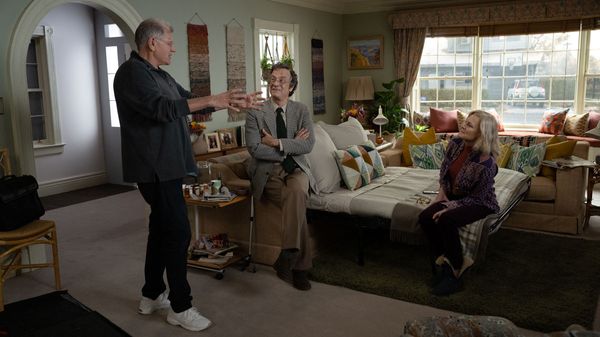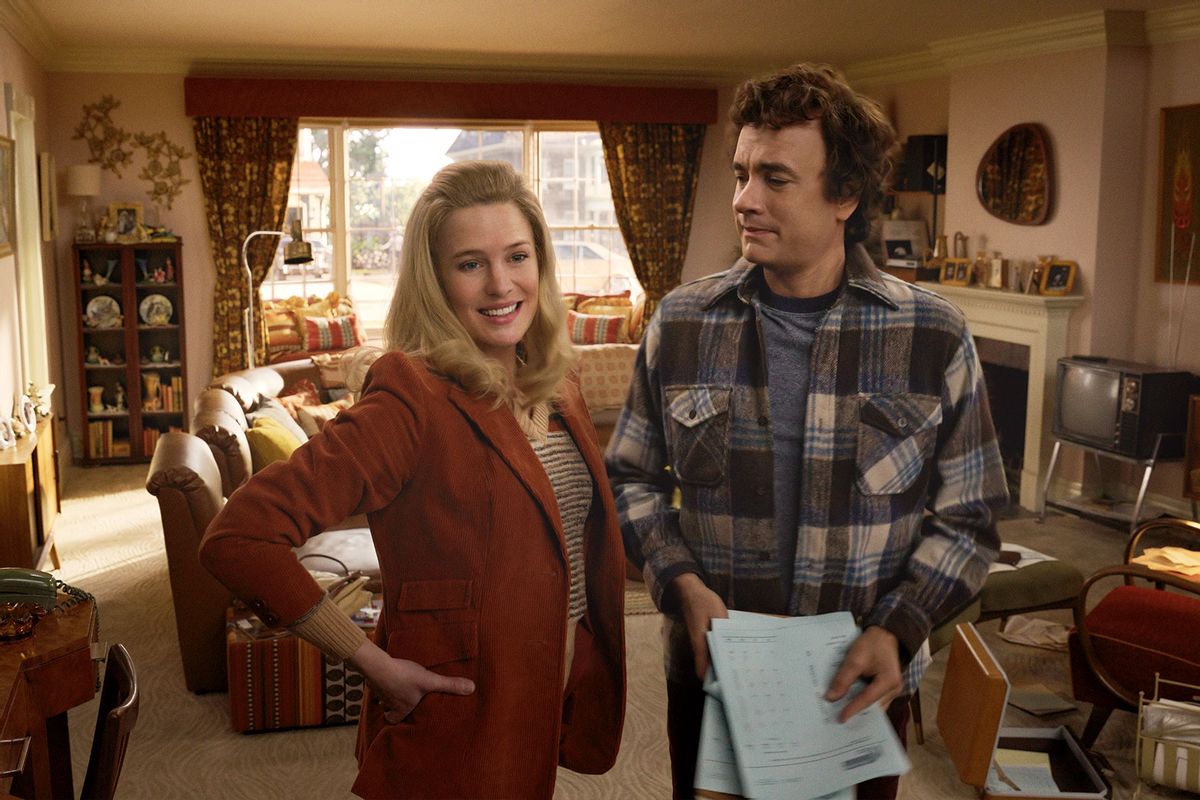Thirty years ago, director Robert Zemeckis gave audiences "Forrest Gump," an exploration of life, love and American history through the eyes of one man, played by Tom Hanks. The film’s legacy remains mixed, with critics spending the ensuing decades deconstructing everything from its awards love to its simplistic view of race and disability. Regardless, "Forrest Gump" cemented its status in pop culture, so the announcement that the core team from that film (Zemeckis, co-screenwriter Eric Roth, composer Alan Silvestri, and leads Hanks and Robin Wright) were reuniting for another movie yielded a large amount of curiosity.
The end result, "Here," is another example of Zemeckis’ love for technological advancement. Based on Richard McGuire’s graphic novel of the same name, the movie tells the story of one specific Pennsylvania house and the numerous inhabitants who, over generations, have seen moments of their lives unfold there.
It’s impossible not to look at "Here" through the lens of "Forrest Gump," and the crew involved certainly seems to understand that. Silvestri’s quiet, contemplative score feels akin to his composition for "Forrest Gump." It also celebrates America through the lens of individual people living, and being affected by, history being made. Unlike the broad, Zelig-esque moments of "Forrest Gump" encountering the Watergate break-in and Vietnam, "Here" goes for the founding of our country, hints at Vietnam, and the early days of the COVID pandemic. Though the film takes place at disparate points in time, going all the way back to the prehistoric era, it doesn’t look a whole lot different to today. It also celebrates America through the lens of individual people living, and being affected by, history being made.
It’s impossible not to look at "Here" through the lens of "Forrest Gump," and the crew involved certainly seems to understand that.
We see fathers and sons torn apart by the rise of the Revolutionary War, fears of technological innovations, and a rather haphazard discussion between a Black family about how to handle the police. "Forrest Gump" though had the benefit of time on its side, and came out during a year of relative political and economic stability. The Vietnam War had been over for 20 years by the time "Forrest Gump" debuted, so its lack of context on the war (or the viewpoints of the Vietnamese) and sunny depiction of Army hospitals were easy to ignore. Young people didn’t remember Vietnam clearly, and those who did were more accepting of a cinematic depiction of it. But in our current political climate – and a life-altering election – there’s something jarring about "Here’s" presentation of a sunnier, happier world in the past.
 Robert Zemeckis, Tom Hanks and Robin Wright on the set of "Here" (Sony Pictures/TriStar Pictures/Jay Maidment)Because "Here" only gives us snapshots of the various people’s lives within the house, or the area where the house is eventually built, it lacks any sense of depth or context for the events happening. So, we get an Indigenous couple living in bliss and idle, but not the bloody colonization that would see them moved from the land and this happy house – filled predominately with white families – built in its place. There is a passing equivalent to a land acknowledgment when a group of academics come and ask to look in the house’s backyard for Native artifacts. The American Revolutionary War, which we’ve seen co-opted in politics for the last few years, is fought and won in the span of a few seconds. Even the arrival of COVID is played through one scene of a Latina maid declaring “I can’t smell anything” and dying. It’s fairly laughable that, in 2020, the Black family in these scenes doesn’t have a TV or is otherwise shown as having little concern for COVID at all.
Robert Zemeckis, Tom Hanks and Robin Wright on the set of "Here" (Sony Pictures/TriStar Pictures/Jay Maidment)Because "Here" only gives us snapshots of the various people’s lives within the house, or the area where the house is eventually built, it lacks any sense of depth or context for the events happening. So, we get an Indigenous couple living in bliss and idle, but not the bloody colonization that would see them moved from the land and this happy house – filled predominately with white families – built in its place. There is a passing equivalent to a land acknowledgment when a group of academics come and ask to look in the house’s backyard for Native artifacts. The American Revolutionary War, which we’ve seen co-opted in politics for the last few years, is fought and won in the span of a few seconds. Even the arrival of COVID is played through one scene of a Latina maid declaring “I can’t smell anything” and dying. It’s fairly laughable that, in 2020, the Black family in these scenes doesn’t have a TV or is otherwise shown as having little concern for COVID at all.
Want a daily wrap-up of all the news and commentary Salon has to offer? Subscribe to our morning newsletter, Crash Course.
But this is the Zemeckis way. The point isn’t to dive into the messy politics of why things happened, but how the average American family lived around them. Unlike "Forrest Gump," the families here aren’t really making history. The exception is found in the spare moments with Stella and Leo (Ophelia Lovibond and David Fynn), a loving couple who strike it rich when Leo invents the La-Z-Boy recliner. It’s a cute throwback to Forrest Gump’s invention of the smiley face t-shirt and the “Shit Happens” logo, but feels ancillary to the more fleshed-out families around them. The rest of the families are forced to respond to changes happening in the world, like a Victorian woman (Michelle Dockery) dealing with her husband’s love of the newfangled airplane, which he declares is going to take them “into the future” (and, yes, it is said with all the power of Doc Brown).
Watching "Here" is akin to watching a willful erasure of how the past has been weaponized over the last several years.
However, with audiences watching "Here" already living in the midst of so much history, and COVID still very much a presence for a large section of America, it’s hard to really feel like it’s worth going back and celebrating anything. It’s akin to the immediate aftermath of 2020, where movies and TV tried to document what was happening, socially and politically, in what felt like real-time. It’s why the 30-year gap, the time period generally adhered to before pop culture looks back on the past, works so effectively. It creates distance and allows the audience to look back with the benefit of hindsight and additional growth.
Right now, watching "Here" is akin to watching a willful erasure of how the past has been weaponized over the last several years. Watching the one Black family in the entire house’s history spend two minutes telling their son how to interact with the police comes off as perfunctory, particularly since the movie never deals with the history of restrictive covenants which, no doubt, would have prohibited Black families from even owning the house we’re seeing in the 1940s.
What made "Forrest Gump" work so well was the benefit of time. It’s possible that, had "Here" waited a few more years, its lauding of history could have felt somewhat positive. As it stands right now, watching "Here" is the equivalent of watching your grandparents tell you about how good it was “back in the day” and refusing to hear that actually, it wasn’t.
Read more
about this topic



Shares